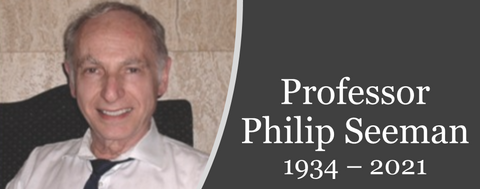Breadcrumbs
Professor Philip Seeman (1934-2021)

We are very saddened to announce that Professor Philip Seeman passed away on Saturday, January 9, 2021.
Professor Philip Seeman OC, MD, PhD, DSc FRSC was a Canadian icon of neuroscience research and neuropharmacology who was renowned for his extensive research on dopamine receptors.
Dr. Seeman was born in Winnipeg (February 8, 1934) and raised in Montreal. He completed a honours B.Sc. degree in physics and physiology (1955), M.Sc. in physiology (1956) and M.D. (1960) from McGill University and internship at Wayne State University. He received a Ph.D. (1966) in life sciences from Rockefeller University, working with Dr. G. Palade (1974 Nobel Laureate) and was a MRC Fellow at the University of Cambridge.
Dr. Seeman was appointed as Assistant Professor in the Department of Pharmacology at the University of Toronto in 1967 and promoted to Professor in 1970, also cross-appointed to the Department of Psychiatry. He served as Chair of the Department of Pharmacology from 1977 to 1987, Head of Psychopharmacology Section, Clarke Institute of Psychiatry and Anne and Max Tannenbaum Chair in Neuroscience.
Among his seminal research discoveries was the 1974 transformative defining of the binding site of antipsychotic medications, the brain’s ‘psychosis receptor’, later known as the dopamine D2 receptor, found to be overactive in schizophrenia. This important discovery formed the basis for the dopamine hypothesis of schizophrenia. He also showed that atypical antipsychotics differed from the classical antipsychotics by their more rapid dissociation from the D2 receptor. He also showed that dopamine supersensitivity results from increased D2 receptors in a high affinity state for dopamine, seen in all known animal models of psychosis.
Dr. Seeman has been the recipient of numerous awards and honours. He was made an Officer of the Order of Canada in 2001 for his “research on dopamine receptors and their involvement in diseases such as schizophrenia, Parkinson’s and Huntington’s”. He was appointed a Fellow of the Royal Society of Canada in 1985. He has received numerous other awards, including the Lieber Award of NARSAD, the Lifetime Achievement Award of the Society of Biological Psychiatry, the Ariens Receptor award of the Dutch Pharmacological Society, the Stanley Dean Award of the American College of Psychiatrists, the Tanenbaum Award for Schizophrenia Research from the Canadian Psychiatric Research Foundation, the first Prix Galien award, the Pasarow Foundation award in Neuropsychiatry, and the Killam Prize in Health Sciences of the Canada Council.
Dr. Seeman’s research accomplishments include ~800 articles with a h-index of 106, i10-index of 405 with citations of 56,000 (Google Scholar). He has mentored over 100 students, post-doctoral fellows and trainees.
For those who knew Dr. Seeman well, his generosity, kindness, mentorship, collegiality and friendship will always be very fondly remembered.
We extend our heartfelt sympathy to his wife, Professor Mary V. Seeman and other family members at this difficult time.
Susan R. George
Tributes to Dr. Seeman
Philip's work was truly inspirational and I had many great interactions with him over the years. So sorry to hear of his passing. - Krista Lanctôt
He was such an inspiration for his great work on dopamine and its receptors. He has left a legacy of many great scientists who trained with him throughout his illustrious career. - Jane Mitchell
Phil Seeman was a dopamine, receptor, and dopamine receptor genius. He always tackled his research and teaching with the highest passion and excitement. - Stephen J Kish
Phil was a giant in Neuropsychopharmacolgy who has left an indelible mark on the landscape of knowledge of the molecular pharmacology of schizophrenia. - Jerry Warsh
Globe and Mail Article: Researcher Philip Seeman shed new light on biology of schizophrenia
